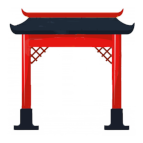| Meaning |

stoop, to bow 屈
|
| Explanation |
|
Used in these characters:
|
|
屈
|
 |
|
JLPT HSK 5 |
|
| crouch, bent, crooked, to feel wronged
|
Top: buttock from the side 尸, bottom: come/go out 出 (Two mountains 山 coming out one after the other)
("plumber's crack or smile", which refers to the visible butt-crack if a guy with a too short shirt crouches.) The buttock (= the crack) comes out when stooping(=bowing).

|
|
|
|
掘
|
 |
|
JLPT HSK 6 |
|
| dig, excavate
|
Left: hand 扌, right: stoop/crouch 屈 (The buttock 尸 [= butt's crack] comes out 出 when crouching. = "plumber's crack or smile")
You use your hands and you are crouched, when: digging.

|
|
|
|
倔
|
 |
|
JLPT HSK 6 |
|
| crabby, stubborn, obstinate, tough
|
Left: person 亻, right: bow, crouch 屈 (The buttock 尸 [=butt's crack] comes out 出 when crouching. = "plumber's crack or smile")
A person who (always) is crouching becomes: crabby.

|
|
|
|
窟
|
 |
|
JLPT no HSK |
|
| cave, hole
|
Top: cave/cavity 穴 (It is covered 宀 and a narrowing path 八 leads into the cave), below: stoop/crouch 屈 (The buttock 尸 [=butt's crack] comes out 出 when: crouching. = "plumber's crack or smile")
A hole where you have to crouch, is a cave.

|
|
|
|
崛
|
 |
|
JLPT no HSK |
|
| towering as a peak
|
Left: mountain 山, right: bow, crouch 屈 (The buttock 尸 [= butt's crack] comes out 出 when crouching. = "plumber's crack or smile")
The mountain that comes out like a buttock, is: towering as a peak.

|
|
|
| Radicals are shown here that are similar either in appearance or meaning. |  |
|
At the page you get the memory phrases for learning the Chinese Hanzi. If you are learning the Japanese kanji, please follow this link. |
List of the characters |
List of the radicals
|

